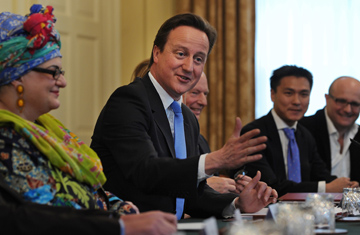
British Prime Minister, David Cameron, gestures as he chairs 'The Big Society' meeting in the cabinet room of 10 Downing Street
David Cameron's path to the head of Britain's Conservative Party — and his recent arrival at 10 Downing Street — was paved with the kind of traditional Tory Euro-skepticism that even two decades after her departure still make "Margaret Thatcher" dirty words on the continent. But since becoming U.K. Prime Minister by forging a coalition cabinet last week, Cameron's formerly hostile rhetoric on Europe has given way to cooperation and pragmatism — for now, at least. Just days after his new government chose not to make a stink over European Union plans to slap regulation on the hedge funds that are so central to London's financial markets, he is embarking on a swiftly organized round of courtesy calls to woo wary leaders in France and Germany.
Cameron's first jaunt abroad as prime minister begins May 20, when he crosses the Channel to the U.K.'s historical nemesis France for meetings with President Nicolas Sarkozy. The following day, he heads to Berlin to huddle with Chancellor Angela Merkel, who rather demonstratively did not take time out to meet with Cameron during her trip to London in the middle of the U.K. election race in April — yet did find time to pow-wow with former Prime Minister Gordon Brown.
According to officials in all three governments, Cameron's excursion is mainly an introductory exercise to discuss a range of broad economic, diplomatic, and European issues that they'll all be dealing with in the coming months and years. Yet it's clear that Cameron's visit to the continent just a week after forming Britain's first coalition government since World War II is also an attempt to reassure that the anti-European positions staked out by his Conservative party in early campaigning won't translate into similarly confrontational action in office. It's also likely that Sarkozy and Merkel will try to gauge how much influence British Deputy Prime Minister Nick Clegg — head of the pro-European Liberal Democrat party that makes up the other half of the U.K. coalition — has had in softening Cameron's E.U. aversion. Because something seems to be reducing the Euro-phobia at No. 10.
"There's an evident signal being sent by Mr. Cameron's first foreign trips being taken to France and Germany — two of the European Union's most activist nations," says one French government adviser. "Far from being fearful his government will only be a thorn in Europe's side, we're both flattered by his decision to come here first, and confident it's the beginning of a productive partnership."
That glass-is-half-full attitude is a relatively recent development — one based in part on the outcome of the May 18 summit of European finance ministers to discuss regulating hedge funds. To the surprise of most participants, according to sources who were in the meeting, British Chancellor of the Exchequer George Osborne did not go further in challenging the proposed new rules than restating the U.K.'s opposition to the move. Almost one-third of the estimated $1.5 trillion in assets managed by hedge funds are based in Europe — and almost all of that is traded on London's financial markets. Osborne's attitude was therefore unexpected, given his party's habitual hostility to encroachment from Brussels.
"No one was surprised by his actual position, but the tone he took to avoid entering the scene with a resounding statement of defiance was a happy surprise to many," an adviser to French Economy Minister Christine Lagarde confides. "It seemed to reflect the pragmatism of the new British government on European issues — one that will defend its interests to be sure, but which also won't waste time alienating friends and allies over battles already lost."
If that's the tune Cameron will be whistling in Paris and Berlin, it's one he's only recently learned. Even under Cameron's more modern, reformist agenda since becoming party leader in December 2005, the Tories remained largely faithful to their Thatcherist hostility to an integrated Europe. Cameron himself opposed the adoption of the E.U.'s Lisbon Treaty, with its goal of further unifying Europe after efforts to ratify a common European constitution failed. He even proposed holding a referendum on whether the U.K. should withdraw from the Lisbon Treaty, which, among other things, created the new role of E.U. President.
Cameron has irked Europeans in other ways, too. There was his decision to pull the Conservatives out of the bloc of mainstream rightist parties elected to the European Parliament — including those both Sarkozy and Merkel hail from — to join a harder right, anti-E.U. group. Sarkozy, for one, is known to have been rankled by that move, which has also been pointed to by analysts as the reason Merkel snubbed Cameron during that April trip to London.
During this week's meetings, Sarkozy and Merkel will doubtless seek to encourage the more temperate language and pragmatic action they have seen from Cameron and his government since they took power. Cameron, meanwhile, may point out that despite its pro-European position, Britain's previous Labour government did not join the euro and refused to contribute to the nearly $1 trillion rescue fund for E.U. nations threatened by debt. And, in the end, all three leaders may go away conceding that successful E.U.-U.K. relations are often based on how both sides agree to differ.
